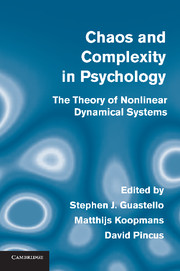Crossref Citations
This Book has been
cited by the following publications. This list is generated based on data provided by Crossref.
Tschacher, Wolfgang
2009.
Encyclopedia of Complexity and Systems Science.
p.
4893.
Guastello, Stephen J.
2010.
Nonlinear Dynamics of Team Performance and Adaptability in Emergency Response.
Human Factors: The Journal of the Human Factors and Ergonomics Society,
Vol. 52,
Issue. 2,
p.
162.
Kretzschmar, William A.
2010.
Language Variation and Complex Systems.
American Speech,
Vol. 85,
Issue. 3,
p.
263.
Nowak, Andrzej
Bui-Wrzosinska, Lan
Coleman, Peter T.
Vallacher, Robin
Jochemczyk, Lukasz
and
Bartkowski, Wieslaw
2010.
Seeking Sustainable Solutions: Using an Attractor Simulation Platform for Teaching Multistakeholder Negotiation in Complex Cases.
Negotiation Journal,
Vol. 26,
Issue. 1,
p.
49.
Townsend, G. C.
Kim, M.
and
Sankey, D.
2012.
Dynamic Systems (Complexity) theory as a new conceptual model for researching PBL in dental education.
European Journal of Dental Education,
Vol. 16,
Issue. 1,
p.
43.
Vallacher, Robin R.
and
Brooks, Christopher
2014.
The Evolution of Violence.
p.
187.
Pincus, David
2014.
One bad apple: experimental effects of psychological conflict on social resilience.
Interface Focus,
Vol. 4,
Issue. 5,
p.
20140003.
Sideridis, Georgios D.
and
Stamovlasis, Dimitrios
2014.
The Role of Goal Orientations in Explaining Academic Cheating in Students With Learning Disabilities: An Application of the Cusp Catastrophe.
Ethics & Behavior,
Vol. 24,
Issue. 6,
p.
444.
Rusk, Reuben D
Vella-Brodrick, Dianne A
and
Waters, Lea
2015.
Components of Appreciative Functioning: A Thematic Analysis of Relevant Literature and Content Analysis of Existing Measurement Scales.
Psychology of Well-Being,
Vol. 5,
Issue. 1,
Merlone, Ugo
and
van Geert, Paul
2016.
Qualitative Theory of Dynamical Systems, Tools and Applications for Economic Modelling.
p.
305.
Held, Tilo
2016.
Erwiderung auf die Arbeit »Child Survivors – geraubte Kindheit« von Kurt Grünberg und Friedrich Markert.
PSYCHE,
Vol. 70,
Issue. 11,
p.
1074.
Galatzer-Levy, Robert M.
2016.
Der Grenzbereich zum Chaos: Ein nichtlineares Verständnis der psychoanalytischen Technik.
PSYCHE,
Vol. 70,
Issue. 11,
p.
1013.
Huppke, Andrea
2016.
Rezension: Melcher Imke, Franz Alexander und die moderne Psychotherapie.
PSYCHE,
Vol. 70,
Issue. 11,
p.
1099.
Astroh, Michael
2016.
Die Sprache des anderen.
PSYCHE,
Vol. 70,
Issue. 11,
p.
1067.
Bürgin, Dieter
Pless, Silke
and
Staehle, Angelika
2016.
Kinder- und Erwachsenenanalyse im Dialog.
PSYCHE,
Vol. 70,
Issue. 11,
p.
1041.
Heenen-Wolff, Susann
2016.
Die psychoanalytische Institution.
PSYCHE,
Vol. 70,
Issue. 11,
p.
1077.
Rusk, Reuben D.
Vella-Brodrick, Dianne A.
and
Waters, Lea
2016.
Gratitude or Gratefulness? A Conceptual Review and Proposal of the System of Appreciative Functioning.
Journal of Happiness Studies,
Vol. 17,
Issue. 5,
p.
2191.
Holmes, Maren
2016.
Rezension: Heimann Paula, Gegenübertragung und andere Schriften zur Psychoanalyse. Vorträge und Aufsätze aus den Jahren 1942–1980.
PSYCHE,
Vol. 70,
Issue. 11,
p.
1096.
Davies, Adam
2018.
From ‘disorder’ to ‘challenge’: Using lifespan development theories to reframe distress.
Counselling Psychology Review,
Vol. 33,
Issue. 1,
p.
24.
Rusk, Reuben D.
Vella-Brodrick, Dianne A.
and
Waters, Lea
2018.
A complex dynamic systems approach to lasting positive change: The Synergistic Change Model.
The Journal of Positive Psychology,
Vol. 13,
Issue. 4,
p.
406.





